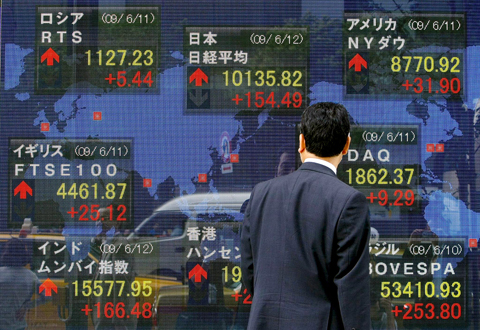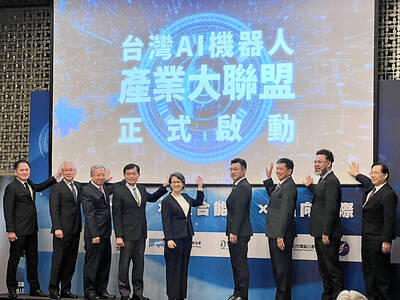China’s retail sales and industrial output grew strongly last month as the government spent heavily on a stimulus to boost growth in the world’s third-biggest economy as exports plunged.
Retail sales rose 15.2 percent compared with May last year, up from April’s 14.8 percent growth rate, the Chinese National Bureau of Statistics reported yesterday. Industrial output rose 8.9 percent, rebounding from April’s lackluster 7.3 percent and exceeding March’s 8.3 percent rate.
Beijing is trying to shield China from the global slump by boosting domestic consumption with a 4 trillion yuan (US$586 billion) plan to inject money into the economy through spending on building highways and other public works.

PHOTO: EPA
Yesterday’s data highlighted the economy’s heavy reliance on government spending to maintain growth and the gap between stimulus-financed industries and struggling fields with exposure to plunging exports.
Output of stone and other minerals used in stimulus-financed construction rose 14.7 percent last month, while auto production jumped 29 percent, boosted by sales tax cuts and other government incentives for buyers. Among industries exposed to exports, output of computers and telecommunications equipment grew by just 4.3 percent.
Analysts also point to healthy retail sales as another possible source of growth, though consumer spending is still a relatively small portion of China’s economy.
The government has set a growth target of 8 percent this year, though the economy expanded by only 6.1 percent in the first quarter — its slowest rate since the 1990s, but the strongest for any major economy this year. The World Bank says it expects 6.5 percent growth for this year and private sector economists say the economy is improving.

The paramount chief of a volcanic island in Vanuatu yesterday said that he was “very impressed” by a UN court’s declaration that countries must tackle climate change. Vanuatu spearheaded the legal case at the International Court of Justice in The Hague, Netherlands, which on Wednesday ruled that countries have a duty to protect against the threat of a warming planet. “I’m very impressed,” George Bumseng, the top chief of the Pacific archipelago’s island of Ambrym, told reporters in the capital, Port Vila. “We have been waiting for this decision for a long time because we have been victims of this climate change for

MASSIVE LOSS: If the next recall votes also fail, it would signal that the administration of President William Lai would continue to face strong resistance within the legislature The results of recall votes yesterday dealt a blow to the Democratic Progressive Party’s (DPP) efforts to overturn the opposition-controlled legislature, as all 24 Chinese Nationalist Party (KMT) lawmakers survived the recall bids. Backed by President William Lai’s (賴清德) DPP, civic groups led the recall drive, seeking to remove 31 out of 39 KMT lawmakers from the 113-seat legislature, in which the KMT and the Taiwan People’s Party (TPP) together hold a majority with 62 seats, while the DPP holds 51 seats. The scale of the recall elections was unprecedented, with another seven KMT lawmakers facing similar votes on Aug. 23. For a

Taiwan must invest in artificial intelligence (AI) and robotics to keep abreast of the next technological leap toward automation, Vice President Hsiao Bi-khim (蕭美琴) said at the luanch ceremony of Taiwan AI and Robots Alliance yesterday. The world is on the cusp of a new industrial revolution centered on AI and robotics, which would likely lead to a thorough transformation of human society, she told an event marking the establishment of a national AI and robotics alliance in Taipei. The arrival of the next industrial revolution could be a matter of years, she said. The pace of automation in the global economy can

All 24 lawmakers of the main opposition Chinese Nationalists Party (KMT) on Saturday survived historical nationwide recall elections, ensuring that the KMT along with Taiwan People’s Party (TPP) lawmakers will maintain opposition control of the legislature. Recall votes against all 24 KMT lawmakers as well as Hsinchu Mayor Ann Kao (高虹安) and KMT legislative caucus whip Fu Kun-chi (傅崐萁) failed to pass, according to Central Election Commission (CEC) figures. In only six of the 24 recall votes did the ballots cast in favor of the recall even meet the threshold of 25 percent of eligible voters needed for the recall to pass,